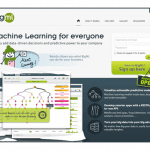This Big Data platform is all about bringing together organizations who want to create a Big Data strategy and match them with Big Data startups. For organizations it is therefore necessary to understand how to use Big Data within an organization. Therefore, we have created a top 8 of the best Big Data use cases for organizations. Please let us know if you have more or … [Read more...] about 8 Different Big Data Use Cases For Your Organisation
Big Data
Learn everything you need to know about big data. Find out how companies are using this revolutionary technology and what it means for your business strategy.
The Advantages of Big Social Data For Your Organisation
At the moment there are more than 1 billion Facebook users, of which around 850 million are active on a monthly basis. There are more than 100 billion connections and each day gives us 2.7 billion new likes. Twitter has 500 million users and 180 million tweets are sent every day. Approximately 100 million Twitter users are active on a monthly basis. Linkedin has 200 million … [Read more...] about The Advantages of Big Social Data For Your Organisation
The Big Data Trends for 2013
A lot has been written already about Big Data trends for 2013 and here at Datafloq we want to add a few that we believe will be important for 2013. According to the Emerging Technologies Hype Cycle published by Gartner in the summer of 2012, the trend Big Data has just entered the Peak of Inflated Expectations, meaning that everyone expects everything from Big Data. Gartner has … [Read more...] about The Big Data Trends for 2013
Big Data Startup BigML Offers Machine-Learning as a Service
Company BigML Address 2851 NW 9th St, Suite D Corvallis, OR, 97330 USA Founders Dr. Francisco J Martin, Adam Ashenfelter, Justin Donaldson, Francisco J Martin, Jose Antonio Ortega & Jos Verwoerd Founded January 2011 Funding $ 0 Employees 11 Website www.BigML.com Rating 4 bits Machine Learning for everyone is the claim BigML makes on their homepage. They … [Read more...] about Big Data Startup BigML Offers Machine-Learning as a Service
The Big data Open Source Landscape Is Growing Rapidly.
Although Big Data Startups reviews startups who deal with big data and who sell licensed products, it is important to note that the landscape of open source tools is growing rapidly as well. They have proven to be efficient and cost-effective in getting big data stored, analysed and visualised. Open source data and open source products are no longer as risky as they used to be, … [Read more...] about The Big data Open Source Landscape Is Growing Rapidly.
What is big data?
Big data is a term that refers to the massive amount of digital data created and shared every day. Big data can transform how we live, work, and communicate. It can be used to improve everything from public health and urban planning to business and marketing.
Big data is also changing the way we think about privacy and security. The volume, velocity, and variety of big data present challenges and opportunities for organizations and individuals. Regardless, big data is here to stay, and its impact will only continue to grow in the years to come.
What is big data analytics?
Big data analytics is the process of turning large, complex data sets into actionable insights. Businesses use various analytical tools and techniques, including machine learning and statistical analysis, to do this.
Big data analytics can be used to improve decision-making in areas like marketing, operations, and customer service. It can also be used to identify new business opportunities and optimize existing processes. With the help of big data analysis, businesses can gain a competitive edge by using their data better.
Want to learn more about big data? Datafloq has courses available. Contact us to get started.
When was big data introduced?
The term big data was coined in the 1990s, with some giving credit to John Mashey for popularizing the term. However, the concept of big data has been around for much longer.
Where does big data come from?
In the early days of computing, scientists and businesses began to realize that the amount of data being generated was increasing exponentially. As a result, they began to develop new methods for storing and processing data.
Over time, these methods have become increasingly sophisticated and have played a key role in enabling businesses to make sense of vast amounts of information. Today, big data is used in various industries, from retail to healthcare, and its importance is only likely to grow in the years to come.
What are examples of big data?
One of the most common examples of big data is social media data. With over 2 billion active users, Facebook generates a huge amount of data every day. This includes information on user interactions, posts, and even location data. Analyzing this data can help companies better understand their customers and target their marketing efforts.
Another example of big data is GPS signals. These signals are constantly being generated by devices like cell phones and fitness trackers. When combined with other data sets, GPS signals can be used to provide insights into everything from traffic patterns to human behavior. Finally, weather patterns are another type of big data set. By tracking these patterns over time, scientists can better understand the impact of climate change and develop strategies for mitigating its effects.
How do companies use big data?
Companies use big data in marketing, product development, and customer service. By analyzing large data sets, businesses can identify patterns and trends that would be otherwise difficult to spot. For example, a company might use big data to track customer behavior patterns to improve its marketing efforts.
Alternatively, a company might use big data to improve its products by identifying areas where customers are most likely to experience problems. For instance, big data can be used to improve customer service by finding pain points in the customer journey. Ultimately, big data provides companies with a valuable tool for gaining insights into their business operations.







